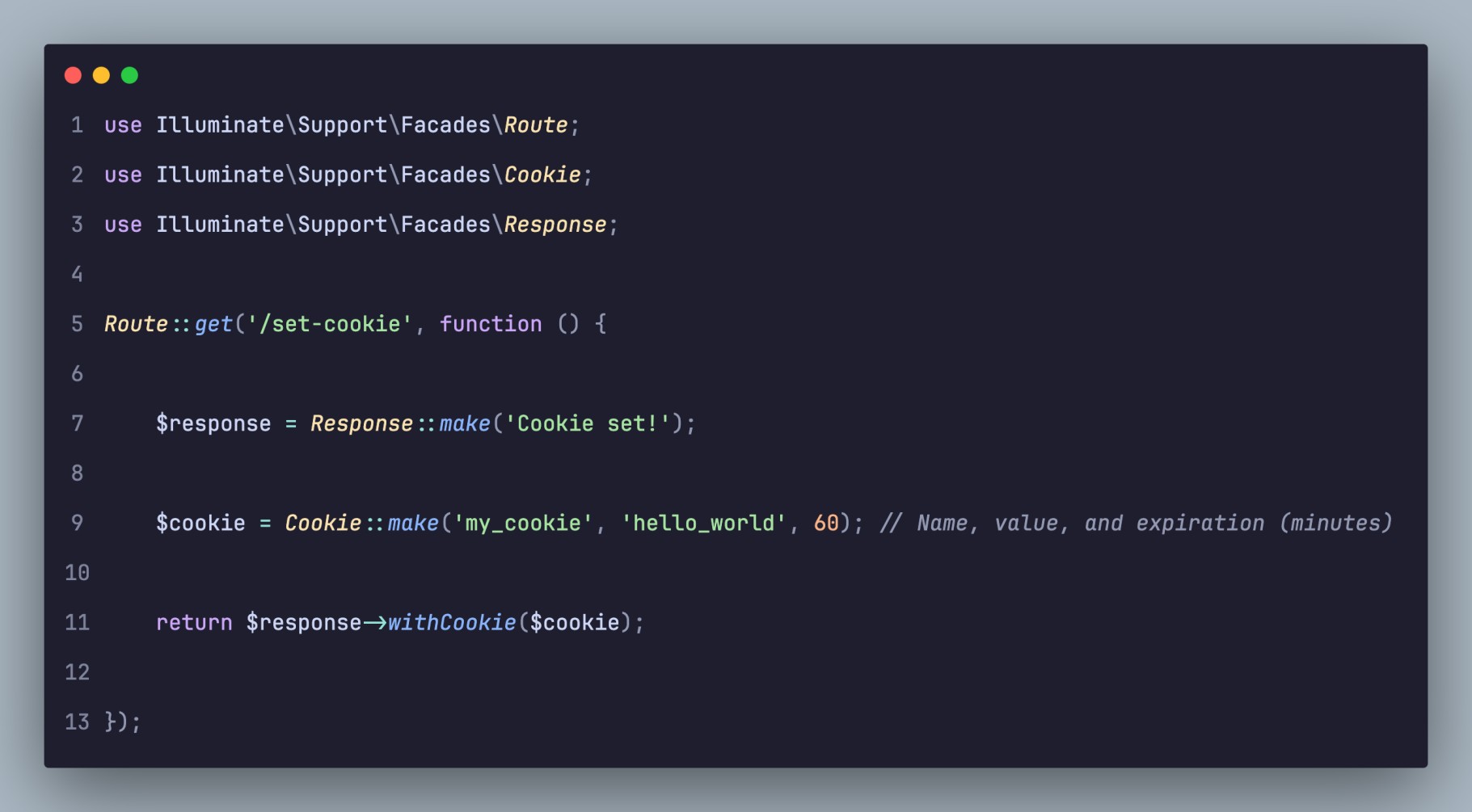Hello everyone! If you come across this page, then you are in the right place. Today, I’ll make sure that this blog post will help you to create a clear vision about Laravel Cookies.Let’s chat about something that is fundamental to web browsing: Cookies. Definitely you have already encountered them, even if you haven’t given them much thought.
In the web development series, cookies are the small parts of data that a website asks for browsing to store.If you think of them as digital breadcrumbs—the little bits of information that websites can leave with you, and your browser remembers them for later use.
Why Websites Use Cookies (and Why That’s Useful)
Cookies help websites to do some really useful things:
- Remembering Your Login: Cookies are often used to keep you logged in between visits. This is the way, where you don’t have to type your credentials every single time.
- Personalized Experiences: Websites can store the preferences in the cookies, such as the language you prefer, theme settings, or the items that are in your shopping cart. This helps them tailor the experience to you.
- Website Analytics: Cookies are enabled to track how you interact with a website. It means Cookies are an efficient tracker in themselves. This data helps the website owners to understand how people are using their site and make improvements.
Laravel 12.x and Cookies: A Smooth Combination
By default,Laravel always provides a crystal clear and straightforward way to work with cookies. Now we will see how it is handled in Laravel 12.x.
Setting Cookies
It is very easy in Laravel, to attach cookies to your responses. Let’s see a basic example within a route closure below:
PHP
use Illuminate\Support\Facades\Cookie;
use Illuminate\Support\Facades\Response;
use Illuminate\Support\Facades\Route;
Route::get('/set-cookie', function () {
$response = Response::make('Cookie set!');
$cookie = Cookie::make('my_cookie', 'hello_world', 60); // Name, value, and expiration (minutes)
return $response->withCookie($cookie);
});

Evaluating the breakdown:
- We can create a response while using Response::make().
- We may generate a cookie while using Cookie::make(), specifying the cookie’s name (my_cookie), value (hello_world), and lifespan (60 minutes).
- We may attach the cookie to the response using $response->withCookie($cookie). It’s very important to note the change here. Instead of using $response->cookie(), we can use $response->withCookie().
Retrieving The Cookies
You can also access cookie values while using the Cookie facade:
PHP
use Illuminate\Support\Facades\Cookie;
use Illuminate\Support\Facades\Route;
Route::get('/get-cookie', function () {
$value = Cookie::get('my_cookie');
if ($value) {
return 'The value of my_cookie is: ' . $value;
} else {
return 'Cookie not found!';
}
});
This code naturally attempts to retrieve the value of the my_cookie cookie.
Removing Cookies
While removing a cookie, you can use Cookie::forget():
PHP
use Illuminate\Support\Facades\Cookie;
use Illuminate\Support\Facades\Response;
use Illuminate\Support\Facades\Route;
Route::get('/delete-cookie', function () {
$response = Response::make('Cookie deleted!');
$cookie = Cookie::forget('my_cookie');
return $response->withCookie($cookie);
});
Key points:
- We can use Cookie::forget(‘my_cookie’) to generate a “forget” cookie.
- Next we attach this “forget” cookie to the response using $response->withCookie($cookie). This effectively commands the browser to delete the cookie.
Important Considerations for Cookies
- Security First: It is quite possible that Cookies can be modified by the users, so never store directly any sensitive data in them. Laravel offers the encrypted features to help secure cookie data.
- Respect Privacy: Always be transparent with your users about how you use the cookies while working.So, it is very obvious to provide mechanisms for them to manage their cookie preferences and comply with the privacy regulations.
- Cookie Lifespan: Cookies are set to uniformly expire at a specific time or when the browser closes. You can wisely choose the expiration times, based on your application’s requirements.
Read More Blog Posts:
How to Work With Laravel Helpers
Laravel File Storage: An Easy Guide for Developers
Start your Development with Laravel Events and Listeners
Cookies: Small Data, Big Impact
While coming to a conclusion, it can be said that,Cookies are small pieces of data that efficiently play a significant role in how we experience the web. They allow the websites to remember us, personalize our interactions, and gather valuable insights. By default, Laravel 12.x provides the tools you need to manage cookies effectively in your applications.
I hope this updated guide is quite useful! Let me know if you have any queries in the comment box.
